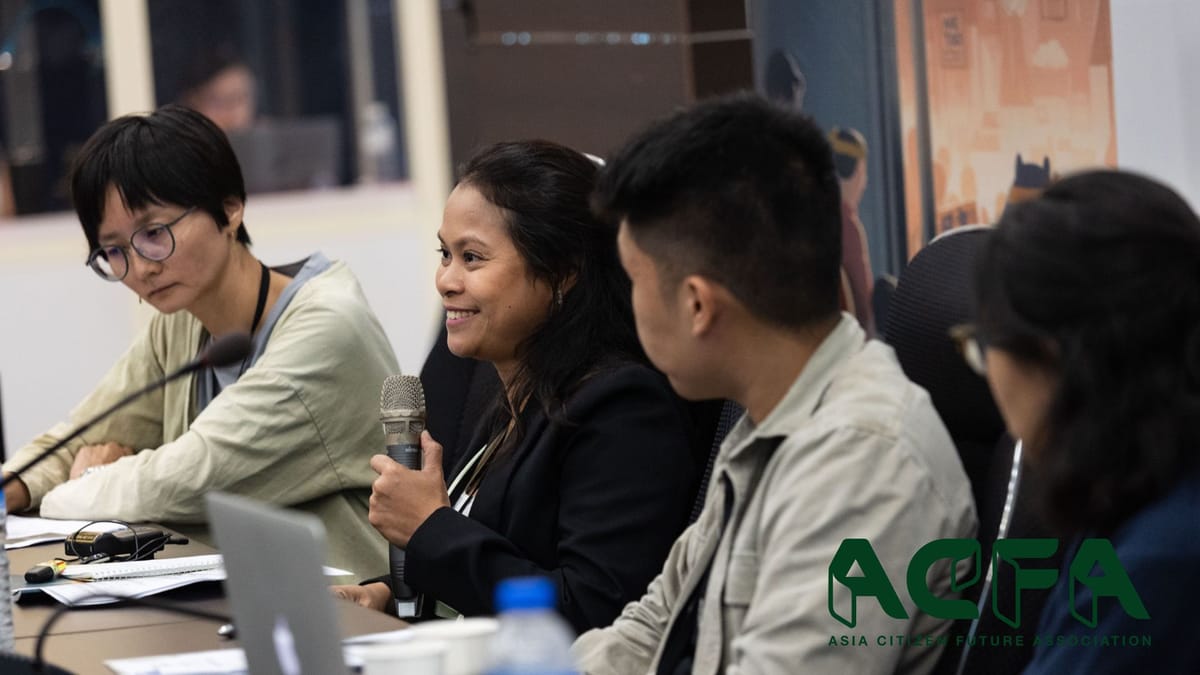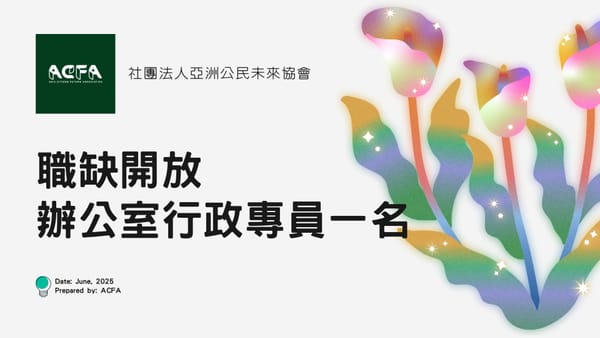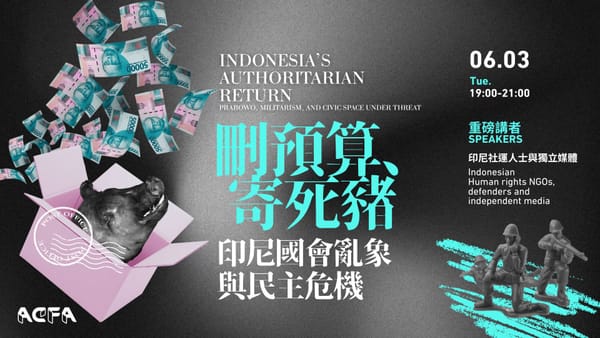“Repression on Media Freedom Continues as New Government Formed” A brief introduction of press freedom and freedom of association in Cambodia

Note taking: Doris Yang / Editing: Leah Lin
ACFA (Asia Citizen Future Association) is honor to invite Chhan Sokunthea, the media director of the Cambodian independent media "Kamnotra", to talk about the current situation of freedom of association and press freedom in Cambodia for us to understand the current situation and trends of the shrinking of civil space in the country. This is the record of the sharing of Chhan Sokunthea on ACFA's report launch forum on 22 August,"Exploring Taiwan's Roles Amid The Crisis of Closing Civic Space in the Southeast Asia" during the ACFA 2023 Taiwan and Southeast Asia Civil Society Week.
About the speaker
Chhan Sokunthea, working for the Cambodian Human Rights and Development Association (ADHOC) from 1st April 1998 to 31th December 2020. She held responsibilities for International Advocacy Coordination. Sokunthea graduated with a Master’s Degree in Public Administrative. Sokunthea has had extensive experience in advocating with government officials, civil society, international community and relevant stakeholders for the promotion and protection of human rights and democracy, including corporate respect for human rights, labour rights, gender equality and inclusion.
Currently she is the acting director of the Cambodian Center for Independent Media. Primary responsible for overseeing the organization by working closely with government institutions, UN Agencies, civil societies both local and international and private sectors to promote and strengthen the press freedom and internet freedom in Cambodia. (provided by Chhan Sokunthea)
Deteriorating Shrinking Civic Space Since 2015
Since 2015, the situation of shrinking civic space continues to deteriorate. Independent media, civil society organizations (CSOs) and political parties are subjected to government's repression. In 2017, independent media such as Radio Free Asia and The Cambodia Daily, and so on, were forced to close and relocate from Cambodia. Furthermore, Cambodia's largest opposition party, Cambodia National Rescue Party (CNRP) was dissolved in the same year. Earlier this year, one of Cambodia's remaining independent media run of the Cambodia Center for Independent Media (CCIM), Voice of Democracy (VOD), was shut down because of a report about Hun Manet, the son of the previous PM, Hun Sen, who now serves as Cambodia's new Prime Minister.
Before Cambodia's general election in July this year, CCIM launched a new site, Kamnotra. Besides reporting news, Kamnotra also organizes data released by the Cambodian government. However, the Mniistry of Telecommunication soon ordered internet service providers to block Kamotra. Therefore, readers based in Cambodia need to use VPN to access to online independent media such as Kamnotra, Radio Free Asia, The Cambodia Daily, and so forth.
Law on Association and Non-Governmental Organization (LANGO)
The Law on Association and Non-Governmental Organization (LANGO), which was enacted in 2015, was used by the Cambodian government to lay restrictions on local, international/foreign NGOs operating in Cambodia. In response, more than 500 civil society workers formed a working group together to provide the Ministry of Interior legal analysis during 2020 to 2021 with an intention to lift the restrictions on the civil society. The situation deteriorates after 2021.
For example, local and international NGOs operating in Cambodia are required to submit financial reports to the Ministry of Interior, the Ministry of the Foreign Affairs (MOFA), and the Ministry of Finance and declare taxation every month. Furthermore, organizations working on human rights, democracy, freedom of expression, and so forth, must submit their yearly activities plan.
There were few restrictions laid on INGOs before, however, they were subject to the government's repression in recent years. In order to continue to operate lawfully in Camodia, INGOs are required to sign MOU with the Ministry of Foreign Affairs every 2 to 3 years. In order to get the MOFA's approval or renewal of the MOU, organizations advocating for human rights and democracy have to submit all the agreements they signed with other civil society organizations.
Repression on Media Freedom Continues as New Government Formed
Hun Manet officially became Cambodia's new Prime Minister in August, 2023. Notably, Hun Manet was not on the list of the Prime Minister candidates before the general election in July 2023. Hun Sen, previously served as Cambodia's Prime Minister for 38 years, who was also the PM candidate, however, announced that he was going to transfer the power to his son, Hun Manet, after the general election.
In the new Cambodian Parliament's first session on 21 August, Cambodian mainstream, pro-government media gathered in the Parliament; however, independent journalists were not allowed to enter the Parliament. This shows the repression against Cambodia's media freedom continuing.






